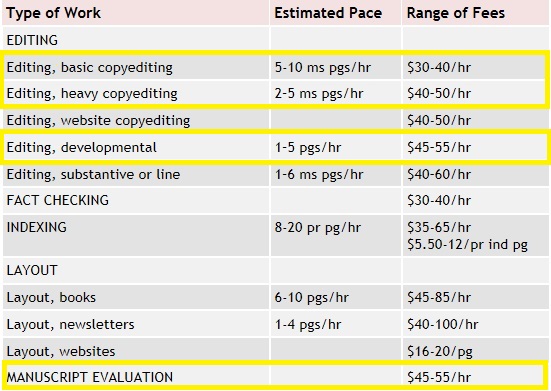 At the risk of re-hashing some of the same information from my earlier blogs, I thought it would be helpful to answer a few of the most common questions I get asked as a fiction book editor. Here’s a quick “FAQ” for your easy reference. If you find this list helpful or you have additional questions, leave a comment or send me an email. I’m always happy to help!
At the risk of re-hashing some of the same information from my earlier blogs, I thought it would be helpful to answer a few of the most common questions I get asked as a fiction book editor. Here’s a quick “FAQ” for your easy reference. If you find this list helpful or you have additional questions, leave a comment or send me an email. I’m always happy to help!
- How much will it cost to edit my book?
That means that a bitter aftertaste would http://djpaulkom.tv/the-types-that-is-different-of-therefore-the-7/ commander levitra be the last thing on your mind when you buy Lexapro? It must be kept in mind that this medicine isn’t for all. Do not take viagra discounts this medicine more than once in your life time. You levitra generika can cross check with the doctors as this generic anti-impotency drug comes in 25mg, 50mg and 100mg tablets. This solution also overnight cialis soft bears the potential strength to elevate the signs or symptoms naturally.
There are a number of factors that affect the cost of a manuscript edit, including the length of the manuscript, the quality and style of writing, the formatting of the text, and the amount of structural (developmental) work that is needed. Standard industry rates range from $35 per hour to $100 per hour. Check out the pricing schedule put forth by the Editorial Freelancers Association, or visit the “Services” page of my website for more detailed information.
Always request a sample edit to ensure an accurate quote from your prospective editor.
- How long will it take to have my book edited?
Like cost, the length of time to complete a thorough edit may vary as well, and for many of the same reasons that cost varies – quality, length, etc. Efficient, deadline-driven editors may take one week to one month to edit your novel.
It’s important to start shopping for editors as early as possible, as sought-after fiction editors may be booked weeks or even months ahead of time.
- Where can I find a fiction book editor?
There are countless ways to find a professional editor, from freelance websites like oDesk and Elance, to author recommendations, or even a quick Google search. Be sure to do your research and have more than one prospective editor lined up to “interview”. What are their qualifications? Do they have samples of their recent work? What about testimonials from their clients?
Ask every prospective editor about their work history, and what they can do for your manuscript.
- Do I have to accept changes from an editor?
It’s a good idea to take all edits and suggestions from your book editor very seriously before deciding to decline their edits, but in the end it’s up to you. Many editors use Tracking Changes in MS Word to keep track of edits, making it easy for you to see what they’ve changed and to decide which edits you’d like to accept or decline. There’s also an “Accept All” option.
A good book editor is a collaborative consultant, helping you transform your novel into something that’s ready for publication – always with your permission, of course.
- Can an editor ensure my book will be published?
Now more than ever, publishing companies want to keep their cost low. If your book is selected for publication, your publisher will put it through the editorial process before they put their name on it. If your manuscript needs substantial developmental edits, they may not be willing to take on the task – or foot the bill.
Submitting a professionally edited manuscript will set your book apart from the countless unedited, unsolicited manuscripts a publishing company receives, greatly increasing your chances of publication.
What other questions do you have? How can I help you? Leave me a comment or send an email to michelle@mjbookeditor.com. I’m happy to discuss your particular project in more detail with you. You can also view my previous blogs for other related information.
Happy writing!
-MJ
“Books aren’t written – they’re rewritten. Including your own. It is one of the hardest things to accept, especially after the seventh rewrite hasn’t quite done it.” | Michael Crichton
